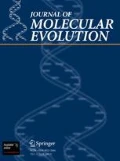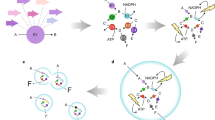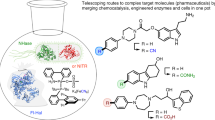Abstract
Processes exhibiting diversity and selection would have been necessary to promote chemical evolution on early Earth. In this work, a model process was developed using non-kinetic selection to synthesize and isolate small molecule imidazolium catalysts. These catalysts were purified by affinity chromatography and recycled back into the process, forming a product feedback loop. In dimethylformamide, the catalysts activated the coupling of formaldehyde to short chain sugars. This sugar mixture was reacted with aniline, acetic acid, and paraformaldehyde to generate new catalysts. Thus chemical diversity was produced through non-selective, multi-component synthesis. Applying sequential dilution-reaction-purification cycles it was demonstrated that this process can function independently of starting catalyst. Over three process cycles, the initiator catalyst is effectively diluted out as a new catalyst population emerges to take its place. This system offers an alternative viewpoint for chemical evolution via the generation of small molecule organocatalysts.








Similar content being viewed by others
References
Breslow R (1958) On the mechanism of thiamine action. IV. Evidence from studies on model systems. J Am Chem Soc 80:3719–3726. doi:10.1021/ja01547a064
Bunik VI, Tylicki A, Lukashev V (2013) Thiamin diphosphate-dependent enzymes: from enzymology to metabolic regulation, drug design and disease models. FEBS J 280:6412–6442. doi:10.1111/febs.12512
Castells J, Geijo F, Lopez-Calahorra F (1980) The “formoin reaction”: a promising entry to carbohydrates from formaldehyde. Tetrahedron Lett 21:4517–4520. doi:10.1016/S0040-4039(00)74538-2
Cleaves HJ (2008) The prebiotic geochemistry of formaldehyde. Precambrian Res 164:111–118. doi:10.1016/j.precamres.2008.04.002
Duclos J, Haake P (1974) Ring opening of thiamine analogs. Role of ring opening in physiological function. Biochem 13:5358–5362. doi:10.1021/bi00723a016
Enders D, Niemeier O, Henseler A (2007) Organocatalysis by N-heterocyclic carbenes. Chem Rev 107:5606–5655. doi:10.1021/cr068372z
Hinterding R, Michalewicz, Eiben AE (1997) Adaptation in evolutionary computation: a survey. In: IEEE International Conference on Evolutionary Computation, pp. 65–69. doi: 10.1109/ICEC.1997.592270
Kim HJ, Ricardo A, Illangkoon HI, Kim MJ, Carrigan MA, Frye F, Benner SA (2011) Synthesis of carbohydrates in mineral-guided prebiotic cycles. J Am Chem Soc 133:9457–9468. doi:10.1021/ja201769f
Kort MJ (1971) Reactions of free sugars with aqueous ammonia. Adv Carbohydr Chem Biochem 25:311–349. doi:10.1016/S0065-2318(08)60431-X
Lambert JB, Gurusamy-Thangavelu SA, Ma K (2010) The silicate-mediated formose reaction: bottom-up synthesis of sugar silicates. Science 327:984–986. doi:10.1126/science.1182669
Mizuno T, Mori N, Shiomi N, Nakatsyji H (1970) Studies on synthesis and utilization of formose. Part 1. Sugar formation by the formaldehyde condensation in the presence of inorganic or organic bases. Nippon Nogli Kagaku Kaishi, J Agr Chem Soc Jpn 44:324–331
Pross A (2004) Causation and the origin of life. Metabolism or replication first? Origins Life Evol Biosph 34:307–321. doi:10.1023/B:ORIG.0000016446.51012.bc
Pross A (2011) Toward a general theory of evolution: extending Darwinian theory to inanimate matter. J Syst Chem 2:1–14. doi:10.1186/1759-2208-2-1
Sagi VN, Punna V, Hu F, Meher G, Krishnamurthy R (2012) Exploratory experiments on the chemistry of the “glyoxylate scenario”: formation of ketosugars from dihydroxyfumarate. J Am Chem Soc 134:3577–3589. doi:10.1021/ja211383c
Teles H, Melder J, Ebel K, Schneider R, Gehrer E, Harder W, Brode S, Enders D, Breuer K, Raabe G (1996) The chemistry of stable carbenes. Part 2. Benzoin-type condensations of formaldehyde catalyzed by stable carbenes. Helv Chim Acta 79:61–83. doi:10.1002/hlca.19960790108
Velisek J, Davidek T, Daviek J, Trska P, Kvasnicka F, Velcova K (1989) New imidazoles formed in nonenzymatic browning reactions. J Food Sci 54:1544–1546. doi:10.1111/j.1365-2621.1989.tb05155.x
Acknowledgments
Ryan Clairmont graciously thanks Dr. Ram Krishnamurthy and Dr. Charlie Liotta for helpful discussions, Anthony Thompson Jr and Christine Conwell for their indispensable support, and many colleagues for productive advice: Beth Cope, Chris Butch, Jon Park, “T” Rubin, “Mick” Robbins, Steph Didas, and Justin Vaughn. The work was jointly supported by the National Science Foundation and the National Aeronautics and Space Administration Exobiology Program, under the NSF-Center for Chemical Evolution, CHE-1004570.
Author information
Authors and Affiliations
Corresponding author
Electronic supplementary material
Below is the link to the electronic supplementary material.
Rights and permissions
About this article
Cite this article
Clairmont, R.M., Bommarius, A.S. & Weber, A.L. Imidazolium Catalysts Formed by an Iterative Synthetic Process as a Model System for Chemical Evolution. J Mol Evol 81, 1–9 (2015). https://doi.org/10.1007/s00239-015-9687-7
Received:
Accepted:
Published:
Issue Date:
DOI: https://doi.org/10.1007/s00239-015-9687-7




